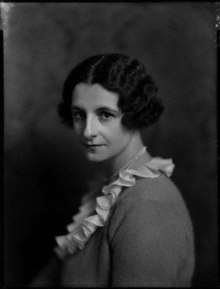Mavis Tate
| Mavis Tate | |
|---|---|
 | |
| Member of Parliament for Frome | |
|
In office 14 November 1935 – 4 July 1945 | |
| Prime Minister | Stanley Baldwin |
| Preceded by | Henry Thynne, Viscount Weymouth |
| Succeeded by | Walter Farthing |
| Member of Parliament for Willesden West | |
|
In office 27 October 1931 – 13 November 1935 | |
| Preceded by | Samuel Philip Viant |
| Succeeded by | Samuel Philip Viant |
| Personal details | |
| Born |
Maybird Hogg 17 August 1893 |
| Died |
5 June 1947 (aged 53) London |
| Political party | Conservative |
Mavis Constance Tate (17 August 1893 – 5 June 1947), baptised Maybird Hogg, was a British Conservative politician and campaigner for British women's rights.
Life
Her first marriage, to Captain G. H. Gott, lasted from 1915 until their divorce in 1925. Her second marriage, to Henry Tate, lasted from 1925 to their divorce in 1944. She suffered a nervous breakdown in 1940.
Tate died in London in 1947. She committed suicide by gassing herself.[1]
Political career
As a member of the Conservative Party, she was elected Member of Parliament (MP) for what under normal political conditions was generally a safe Labour seat Willesden West in 1931. In 1935, she moved to the constituency of Frome, which she held for the Conservatives with a majority of 994. Frome had been a Labour seat during the 1920s prior to her election, and in 1945 she was defeated by the Labour candidate.
It has been alleged that she was an early member of Archibald Ramsay's Right Club from its founding in May 1939, but this seems unlikely as she was one of those protesting publicly against German persecution of the Jews in November 1938.
Women's rights campaign
Tate was an advocate of arming women to resist a German invasion in 1940.
She chaired the Women's Power Committee of 1941 and the Equal Pay Campaign Committee of 1942 and was vocal on the subject of equal pay for women as part of the war effort.[2]
Journalism
Shortly after the end of World War II, Tate travelled with nine others to visit the Buchenwald concentration camp in Germany to report on the result of the atrocities there. She narrated the newsreel of this visit for British Pathé News.[3]
At an inquest on her death the Coroner found that she had committed suicide while her mind was disturbed through ill-health. In a note left for her brother she wrote: "As I have no one dependent on me, it seems to be the wiser thing to end my life. An invalid is only a national liability. Today I cannot endure the extensive, constant pain in my head and I have had practically no sleep at all for week after week." According to the medical evidence, she worked harder than any normal person could be expected to work and it was all in the interest of other people. She faced intense pain from kidney trouble with great courage. Her brother, Col. Kenneth Hogg, said she was always trying to do too much. Her illness dated from the time she visited the Buchenwald horror camp in 1945.
References
- ↑ "Sickness causes suicide". The West Australian. 11 June 1947.
- ↑ "WOMEN'S EQUALITY IS SEEN IN DANGER; Mrs. Tate, British M.P., Says They May Have to Go Back to Kitchens After War". New York Times. 19 June 1943. Retrieved 14 August 2008.
- ↑ Holocaust Uncovered - Taken from the original 1945 British Pathe newsreel "German Atrocities - Proof" on YouTube Retrieved 2 December 2013.
External links
- Hansard 1803–2005: contributions in Parliament by Mavis Tate UK Parliament
- Women of the week Fembio
| Parliament of the United Kingdom | ||
|---|---|---|
| Preceded by Samuel Philip Viant |
Member of Parliament for Willesden West 1931–1935 |
Succeeded by Samuel Philip Viant |
| Preceded by Henry Thynne, Viscount Weymouth |
Member of Parliament for Frome 1935–1945 |
Succeeded by Walter Farthing |